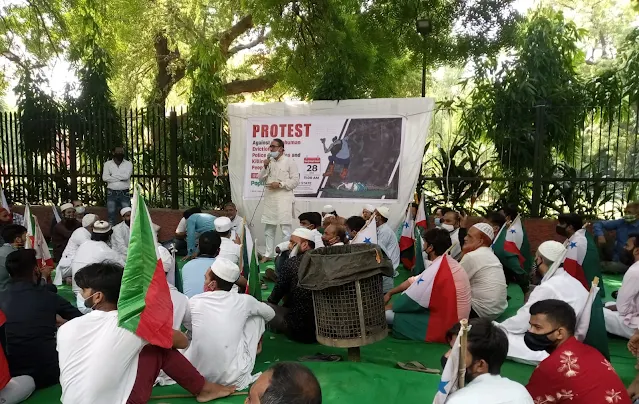By A Representative
Even as the Assam government has named the Popular Front of India (PFI) for being “involved” in the recent violence during an eviction drive in the State’s Darrang district, with Chief Minister Himanta Biswa Sarma terming the group “extremist”, PFI has staged a protest at Jantar Mantar in Delhi against “police atrocities in Assam on helpless protesting people during the inhuman eviction drive.”
In a statement following the protest, PFI said, “It can be seen in the footages coming out of Assam in recent days: Police is seen opening fire without any warning at thousands of people including women and children. A man who get caught up between police personnel was brutally lynched while even media person is seen joining the brutality. Reports suggest that the actual number of casualties might be far higher. One of the three killed appears to be a minor.”
Added PFI, “In the past few days Assam authorities evicted around 4,500 poor helpless people from their houses without presenting any rehabilitation plan by accusing them of illegal encroachment. It is while the case filed against the government move is still in the court that around 800 families were thrown out to street in heavy rain and their houses were destroyed.”
According to PFI, “This eviction drive is quite inhuman”, demanding “intervention of judiciary to bring the eviction to immediate halt” and ensuring “rehabilitation of the people who have already been expelled from their homes.” It added, “Steps must be taken to adequately compensate the victims of the police firing.”
Meanwhile, in a separate statement, another group, the Campus Front of India, rejecting the Assam Chief Minister's allegations, said, it is “a heinous move to cover-up the terror face of the BJP government that happened during the unethical eviction.”
Even as the Assam government has named the Popular Front of India (PFI) for being “involved” in the recent violence during an eviction drive in the State’s Darrang district, with Chief Minister Himanta Biswa Sarma terming the group “extremist”, PFI has staged a protest at Jantar Mantar in Delhi against “police atrocities in Assam on helpless protesting people during the inhuman eviction drive.”
In a statement following the protest, PFI said, “It can be seen in the footages coming out of Assam in recent days: Police is seen opening fire without any warning at thousands of people including women and children. A man who get caught up between police personnel was brutally lynched while even media person is seen joining the brutality. Reports suggest that the actual number of casualties might be far higher. One of the three killed appears to be a minor.”
Added PFI, “In the past few days Assam authorities evicted around 4,500 poor helpless people from their houses without presenting any rehabilitation plan by accusing them of illegal encroachment. It is while the case filed against the government move is still in the court that around 800 families were thrown out to street in heavy rain and their houses were destroyed.”
According to PFI, “This eviction drive is quite inhuman”, demanding “intervention of judiciary to bring the eviction to immediate halt” and ensuring “rehabilitation of the people who have already been expelled from their homes.” It added, “Steps must be taken to adequately compensate the victims of the police firing.”
Meanwhile, in a separate statement, another group, the Campus Front of India, rejecting the Assam Chief Minister's allegations, said, it is “a heinous move to cover-up the terror face of the BJP government that happened during the unethical eviction.”
It added, “The police killed two innocent people in the guise of eviction is clearly an indiscretion. When the issue is being widely criticised and people begin to agitate, the government is seeking ways to renounce their responsibility in the cold blooded crime.”


Comments